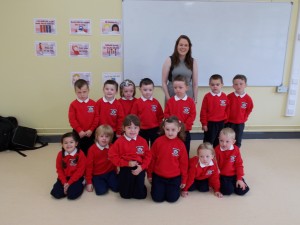Oifigeach Tionscadail de dhíth do Scéim ‘Gaelbhratach’
September 2, 2013
Review of Leaving Cert results
September 2, 2013
Sir, –
This weekend many Leaving Certificate students will be requesting a review of their marks, with the hope of achieving higher grades so that they can attain entry to their preferred course in higher education institutions
There were 16,700 students who completed higher level Irish and 15 per cent achieved an A (Home News, August 14th). The oral component of the exam represents 40 per cent of the total marks, yet these marks cannot be evaluated as teachers do not have access to the interview tapes. This may result in an unfair process for students.
Would it be possible for teachers to have access to these oral recordings?
– Yours, etc,
SEÁN Ó CATHASAIGH,
Secondary School Teacher, Moyglare Village, Maynooth, Co Kildare.
www.irishtimes.com
Foilsithe ar Gaelport.com 2 Meán Fómhair 2013
The Irish Times – Litir Chuig an Eagarthóir
Minister overhauls school enrolment policies
September 2, 2013
Application fees, waiting lists and interviews banned by new legislation Parent-friendly appeals system to be put in place should disputes arise
Schools will no longer be allowed to charge application fees, operate waiting lists or interview parents or children for school places under new legislation to control admissions policies.
Minister for Education Ruairí Quinn, who is publishing the draft legislation and regulations this morning, said their goal was to ensure “a fair and balanced school admissions process”.
The policies, applying to all 4,000 Irish primary and post-primary schools, would end waiting lists and prohibit the acceptance of applications for admission any sooner than October 1st in the year preceding the planned year of the student’s enrolment.
It would also provide for a new parent-friendly appeals system should disputes arise, a much simpler process that would avoid cases sometimes reaching the courts for a decision.
The existing methods used to enrol students have often caused controversy, either because a child was blocked from attending a nearby school or refused enrolment without a satisfactory explanation for the parents.
Fee-paying schools in particular have come under fire for running long waiting lists and adopting enrolment policies that are not transparent.
Many fee paying and State schools also apply charges when a student applies for enrolment ranging from €50 to as much as €200. Many parents concerned to ensure their child gets a place may apply to several schools and apply soon after birth. These charges would be banned under the new legislation.
Complaints
There were also complaints that schools were able to apply “soft barriers” to exclude children with special educational needs. This would no longer apply under the planned legislation as schools would be required to publish the criteria they use for enrolment.
For example, a school might prioritise an applicant who is a sibling of an existing or former student. Schools run by the Church of Ireland would be able to prioritise membership of that church as a condition for enrolment.
Prioritise enrolment
Living near a school could also be used to prioritise enrolment but whatever criteria are used these must be published by the school.
Schools that can show they have existing waiting lists will be given a derogation so that these lists can be cleared over a number of years. However, no new waiting lists can be applied should the legislation come into force.
A first-come-first-served policy for enrolment would also be eliminated under the regulations. This can exclude children who move from one part of the country to another or those who arrive in Ireland from abroad. Instead, students would be accepted for enrolment on the basis of the priorities adopted by the school. Once these had been addressed any remaining places could be selected by a lottery, according to the department.
The regulations were meant to ensure that enrolment i n all schools i n receipt of State funding was transparent, the Minister said.
While he didn’t want to “overly intrude” in the day-to-day operation of schools, the framework “strikes a balance between school autonomy and fairness in our education system and would require schools to provide a better service for parents”, Mr Quinn said.
The draft General Scheme for an Education (Admission to Schools) Bill, 2013 was approved by the Cabinet and will be issued to the Oireachtas Joint committee on Education and Social Protection today to allow a full public discussion, Mr Quinn said.
www.irishtimes.com
Foilsithe ar Gaelport.com 2 Meán Fómhair 2013
The Irish Times – Dick Ahlstrom
(Gaeilge) An lucht léinn
September 2, 2013
New entry rules will prevent schools from ‘cherry-picking’ pupils
September 2, 2013
THE biggest shake-up ever of school entrance rules will ban booking deposits, while putting a strict cap on the number of past-pupils’ children who can be enrolled.
Key legislation published today will radically change the practices schools may employ when it comes to selecting pupils. Schools will no longer be allowed to charge parents booking deposits of up to € 200 under the rules unveiled by Education Minister Ruairi Quinn.
New laws are on the way setting out exactly which practices both primary and post-primary schools may employ when it comes to enrolling pupils. They are designed to give greater clarity to parents, and ensure that enrolment policies and procedures apply fairly to all children.
About one in five schools has selective admissions policies, using criteria such as academic ability or family connections to prioritise who they enrol. A key focus of the reform is to stop such “cherry- picking”, which can result in the exclusion of certain children, such as those with special educational needs.
Another priority is to ensure that children who are newcomers to a community are not at any disadvantage when it comes to getting into a local school.
The ‘firstcome, firstserved’ approach has had the unintended consequence of uneven concentrations of children from migrant families in schools in some communities.
The changes are also aimed at eliminating the costly and cumbersome Section 29 appeals process, the mechanism currently available to parents who want to challenge a school’s refusal to enrol.
But the new ‘ open door’ admissions framework will force some schools to hold a lottery to decide who to enrol, in situations when demand exceeds the number of available places. Key reforms in legislation being published today include:
- A ban on the widespread use by secondary schools of asking parents for money – usually between €50-€200 – in order to hold a place.
- A limit of 25pc on the number of past pupils’ children that a school may enrol in any school year.
- Ending lengthy waiting lists by setting October 1 of the previous year as the start date for accepting applications.
- A ban on interviews of parents or children ahead of enrolments.
- A simplified school- level arrangement for enrolment appeals.
Schools will continue to be allowed to give preference to brothers or sisters of existing or former pupils to avoid disrupting families. And there will be no change to the current arrangements that allow schools to prioritise pupils on the grounds of religion.
The new laws will have little or no impact on the 80pc of schools that currently accommodate all comers, but will force changes for the 20pc that use selection criteria.
The proposals, which have been the subject of discussion and consultation for two years, will now go through the usual legislative process before enactment. This will include consideration by the Oireachtas education committee.
Announcing the proposed legislation, Mr Quinn said he believed “there is a better way of dealing with school admissions”.
He added: “These measures are about what might be described as ‘good housekeeping’ and will bring about greater transparency, fairness and consistency in the way schools operate their admission processes.”
He said while he didn’t want to overly intrude in day-to-day school management, he said the proposed new regulatory framework struck a balance between school autonomy and fairness in the education system.
www.independent.ie
Foilsithe ar Gaelport.com 2 Meán Fómhair 2013
Irish Independent – Katherine Donnelly
Legislation to create more fair and transparent school enrolment process
September 2, 2013
New rules will stop State schools from using ‘low-level discrimination’
The Minister for Education will gain significant new powers to ensure fairness and balance in the enrolment policies of our schools, due to draft legislation published by the Government this morning.
No school in receipt of State funding will be allowed to opt out of the new process: if lack of co-operation persists, an independent person can be appointed, on the approval of a court, to operate its enrolment process.
Students will not be left behind if nearby schools are full or if the child has special educational needs. The National Council for Special Education may designate a place in a particular school to ensure their participation. If a child can’t get a place at a nearby school, the National Educational Welfare Board will also have powers to insist a school provides a place.
‘Soft barriers’
Schools sometimes used “soft barriers” to exclude some children, particularly those with a learning disability, the department said.
“It is below the radar, low-level discrimination,” one source added. The new legislation should now make the process as transparent as possible.
One of the biggest changes is that waiting lists will end. While some schools may be allowed to clear existing waiting lists, in the main these “first come first served” lists will go and different criteria will be applied in enrolment. These will be chosen by the school itself but must be published, making discrimination difficult.
Gone also is the invidious practice of charging for inclusion on the list in the first place. Parents with concerns about getting a place in a neighbouring school might sign up for several schools, paying the charges to each and making a final decision when the child reached school-going age.
Some schools adopted other ways of checking out the ‘suitability’ of prospective students and parents. One was to hold “open days”, making attendance compulsory as a condition of signing up. Compulsory interviews for the child and parents were also used. All of these would be banned under the new legislation.
An ESRI study some years ago showed that 80 per cent of schools in receipt of State funding took in every child presented for admission, the departmental source notes. But that meant 20 per cent claimed they were full up and had to send students away.
These were not all fee-paying schools by any means. Smaller towns might have, say, two secondary schools, with one considered the “good school” and more desirable than the other. This could put admissions pressure on the “good school”, with places unfilled in the other.
Perhaps one of the biggest changes is to the appeals procedures if parents decide to challenge a school’s rejection of a child. Cases taken in this regard often triggered multiple appeals, creating a “significant administrative burden” for schools. The new legislation removes the burden of appealing school decisions from parents.
www.irishtimes.com
Foilsithe ar Gaelport.com 2 Meán Fómhair 2013
The Irish Times, Analysis – Dick Ahlstrom
Búla bos for Cúla Búla!
August 30, 2013
As children all over Ireland return to school, one Irish children’s entertainment company is working hard to make sure that the Irish language is one thing they can look forward to this year. Cúla Búla parties provides new options for children’s parties that allows them enjoy themselves through the medium of the Irish language.
Drawing on experience in Irish education and theatre for young children, Cúla Búla Parties has developed a magical, fun-filled, Irish language experience that brings a love of the language into the home. It is due to sister company Dagda Theatre’s success with practical language learning through workshops and performance that Cúla Búla’s founder Clódagh Nic Gabhann recognised a need for furthering this early love of language through party entertainment, in the form of magic, puppets, face painting and balloon modeling; “The reason that I started Cúla Búla was simple. I personally have a passion for the Irish language and have seen in the past how quickly a child’s attitude can change. Give them positive experiences when they are young and a love will blossom.”
Cúla Búla Parties are putting the ‘Cúl’-a back in the Irish language. For further information about Cúla Búla, check out their website www.culabulaparties.com, call (01) 5357595 or find them on Facebook and keep an eye out for special offers www.facebook.com/culabulaparties.
Clódagh Nic Gabhann, 0852130384, clodagh@culabulaparties.com
Fíbín throws the biggest birthday party in the West!
August 30, 2013
Fíbín Theatre Company brings a vast rock-face to life in a free outdoor video-mapping spectacle on September 13th & 14th in a quarry in Camus, Connemara. Stair na gCeilteach or ‘History of the Celts’ is the action-packed story of the Celts told through the eyes of Vercingetorix, who is celebrating his 3,000th birthday.
Stair na gCeilteach also marks Fíbín’s 10th birthday. Fíbín are well-known for their highly visual style of theatre which often features masks, puppets, video projections and shadow puppetry. This is the company’s first site-specific show and first time to use video-mapping. Managing Director Darach O’Tuairisg says, ’This will be the most exciting visual spectacle Connemara has ever seen. It’s also an opportunity for Fíbín, not alone to celebrate its ten years, but to thank our loyal supporters and to invite people who’ve never seen a Fíbín show to see something new and really different.”
Video-mapping is a state-of-the-art technology of mapping the contours of any surface and projecting vast moving images onto it. The surface appears to spring into life, creating exhilarating 3D imagery and optical illusions. Stair na gCeilteach is directed by Rod Goodall and will be the biggest video-mapping show in Ireland this year. The show features music performed by the award-winning Galway choir Cois Cladaigh and soloist Sarah Grealish for these two special performances.
The show is a collaboration between Fíbín and video-mapping artists Improbable Films from Madrid and forms part of the programme for Culture Connects. Culture Connects is the culture programme connecting Irish artists with European artists and marks Ireland’s Presidency of the Council of the European Union. Stair na gCeilteach is supported by Ealáin na Gaeltachta, a joint venture between Údaras na Gaeltachta and The Arts Council, which promotes the development of the contemporary and traditional arts in the Gaeltacht.
Fíbín’s highly visual style transcends language barriers and has performed to over 400,000 people over its ten years.
The artist Joe Boske painted the poster for ‘Stair na gCeiteach’. People would know Joe’s work from previous Galway Arts Festival posters going down through the years.
Stair na gCeilteach is on September 13th & 14th at 9pm at the Quarry, Furnace Road, Camus, Connemara. Tickets are free but must be reserved by contacting fibinteo@gmail.com or by calling 091 593823. For more information see www.fibin.com
Photographs from the first day of school in the new primary schools!
August 30, 2013
Congratulations to the staff, students, parents and supporters of the three new primary schools that opened this week. GAELSCOILEANNA TEO. wish you every success and we’ll be there to support you every step of the way. The schools’ patron, An Foras Pátrúnachta, has lovely photos of the first day of school on Facebook.
Scoileanna nua pléite ar Raidió na Life
August 30, 2013







